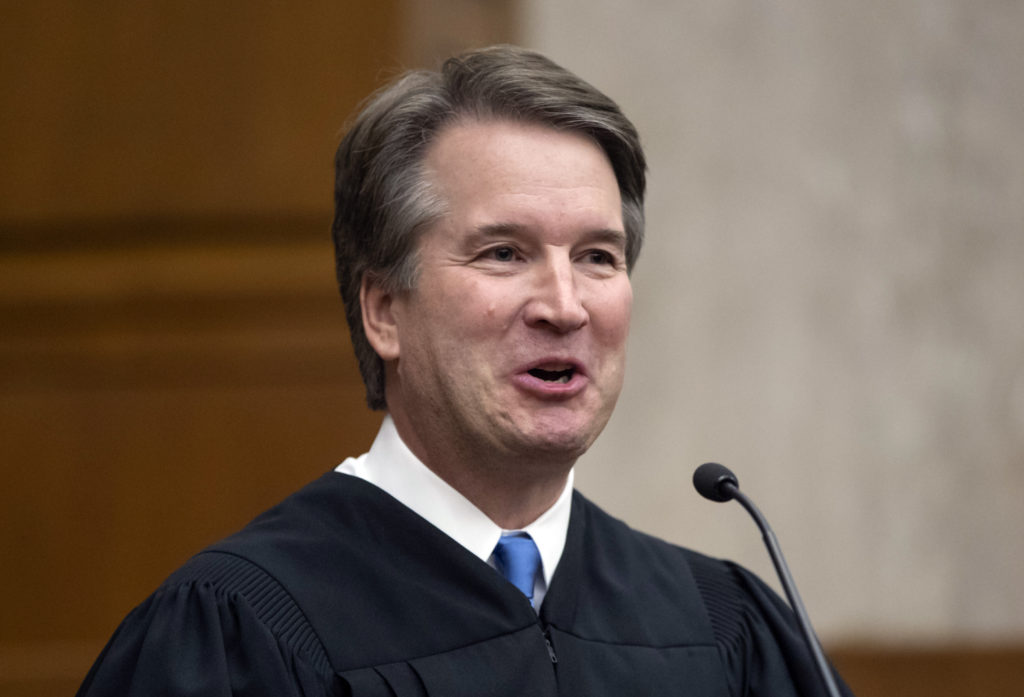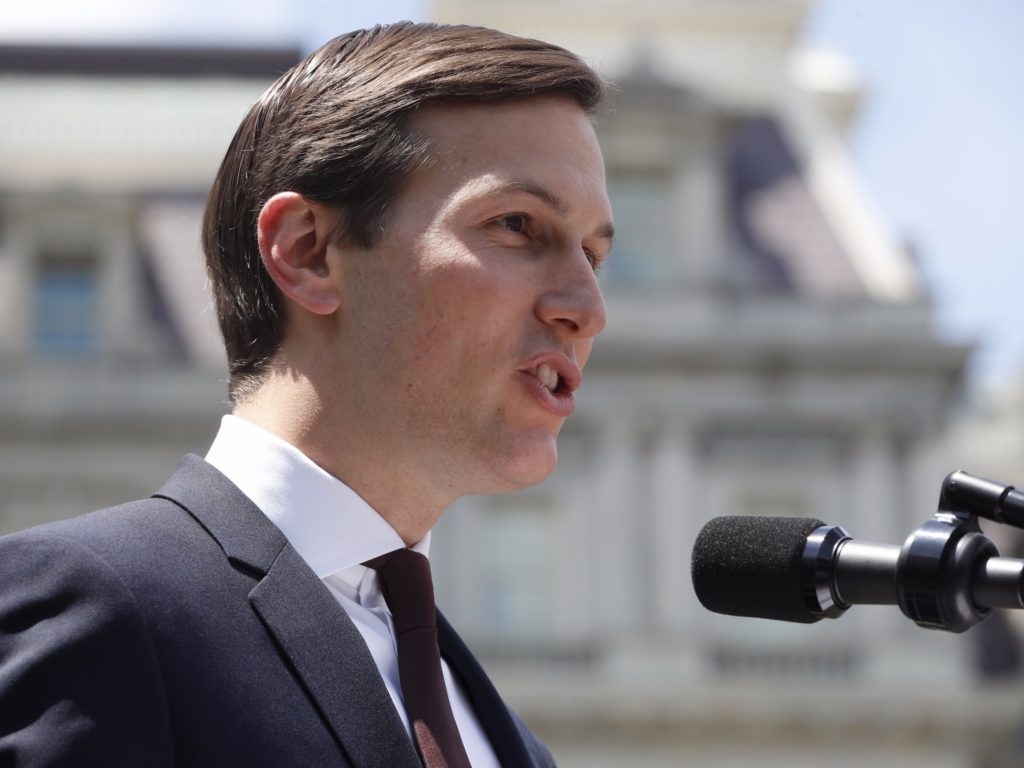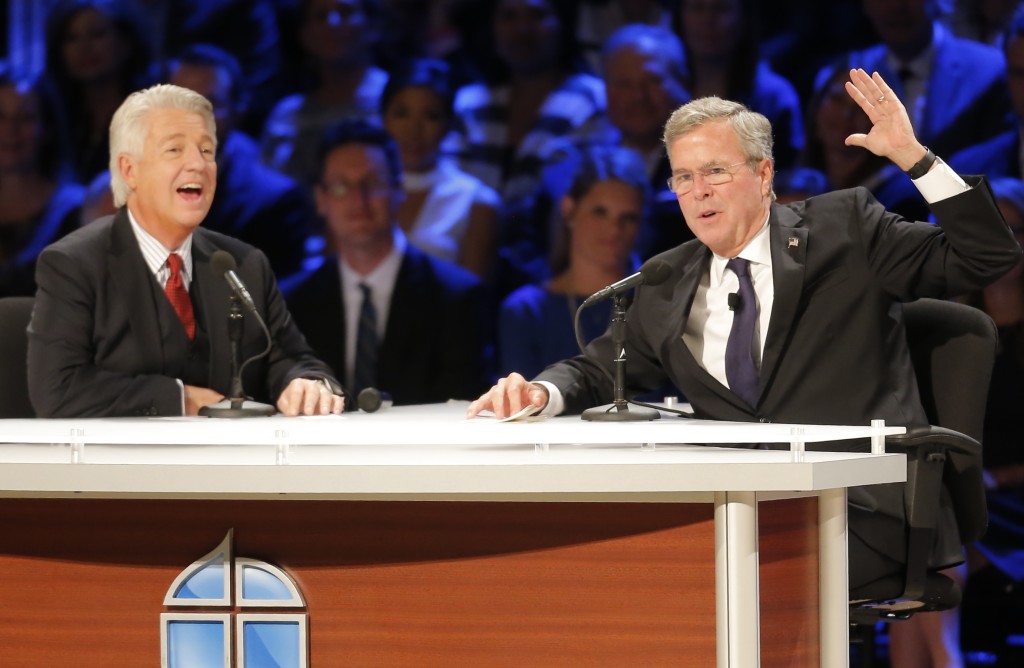Evangelicals push Senate Republicans to confirm Brett Kavanaugh

Evangelical activists want Republican leaders to act more forcefully to send Brett Kavanaugh to the Supreme Court, expressing skepticism about the decades-old allegations of sexual assault levied against the federal judge. The political flashpoint is playing out only weeks before midterm elections in which conservative voters will be critical to the GOP drive to maintain control of Congress. Kavanaugh’s nomination was a prime topic Friday at the annual Values Voter summit as Senate Majority Leader Mitch McConnell, faith leaders and others vowed that President Donald Trump‘s nominee would win confirmation. Family Research Council President Tony Perkins, the organizer of the conference, said Republicans needed to “move much more aggressively,” contending the Senate had been “very accommodating” to California college professor Christine Blasey Ford, who has accused Kavanaugh of sexual assault more than 30 years ago when they were teenagers. Kavanaugh has denied the allegations and offered to testify under oath to the committee. Republicans and Ford were negotiating Friday on whether Ford will testify next week before the Senate Judiciary Committee. Gary Bauer, the president of American Values and a former policy aide to President Ronald Reagan, told the summit that he was praying for Ford but cast doubt over the allegations. To make his point, he re-enacted what a conversation might be like between Ford and law enforcement. “If you walked into a police station, or an FBI agent, if you walked in anywhere and said ‘I want to report a sexual assault.’ ‘Yes, ma’am.’ ‘When did this happen?’ ’36 years ago.’ ‘Excuse me?’ ’36 years ago. Yes.’ ‘Do you have any eyewitnesses?’ ‘Well, there are two eyewitnesses but they both deny it happened,’” Bauer said, drawing laughter from the audience. “‘Where did it happen?’ ‘It was at a house but I don’t know whose house.’ ‘How did you get there?’ ‘I don’t know how I got there.’ ‘How did you get home?’ ‘I don’t know how I got home.’” McConnell was quick to reassure the crowd of core Republican supporters. “In the very near future, Judge Kavanaugh will be on the United States Supreme Court,” the Kentucky Republican said. “Keep the faith, don’t get rattled by all of this. We’re going to plow right through it and do our jobs.” Bauer added that he doesn’t know Ford. “I don’t know her values but what she’s saying is unproven and I would argue it’s unprovable,” Bauer said. “There’s reasons why most laws and most crimes have statutes of limitation. Because a week after a crime, it is difficult to reconstruct what happened. Thirty-six years later? Now look, we can’t prove what she said. But there is something we can prove and that is Judge Kavanaugh’s character.” Perkins said McConnell had been methodical in attempting to win Kavanaugh’s confirmation “but you’ve got to look at what he’s working with. He’s working with some Republicans who look like they grew up on a boneless chicken ranch. They don’t really have much backbone and when it comes to the pressure, they hide.” Perkins said Senate Republicans should allow Ford to speak. “If she says, ‘I can’t do it this day,’ and they give her another day, ‘I can’t do it.’ Look, move forward. The American people deserve a vote as well. Their voice needs to be heard in this process.” Evangelical leaders said if Kavanaugh failed to win confirmation, that could drive up turnout among Republican voters in November, when the party is defending its House majority and a narrow edge in the Senate. But a collapse of the nomination also would direct finger-pointing at Senate leaders and derail a top priority for Trump, who is seeking to cement a conservative imprint on the court for decades. Michele Bachmann, a former Minnesota congresswoman and 2012 Republican presidential candidate, said the 36-year-old allegations against Kavanaugh had “come out of nowhere and I think the Senate has bent over backwards to take this woman’s allegations seriously and to give her a hearing.” “She’s been back-peddling, her allegations have actually been falling apart, they haven’t gotten stronger,” Bachmann said in an interview, adding: “We’re probably going to hear her make allegations and he will deny them. Then it’s really up to the senators to vote. That’s what this is about.” “This whole rollout of this fight against Brett Kavanaugh has been nothing but Kabuki theater and really a disaster on the part of the Democrats,” Bachmann said. “From the very first day when all of their paid people came in and were screaming throughout this hearing. This had nothing to do with order and decorum and getting to the truth.” Republished with permission from the Associated Press.
Evangelical leaders rally around Jared Kushner amid Russia probe

Evangelical leaders are rallying around White House senior adviser and Trump son-in-law Jared Kushner as he meets with congressional leaders investigating Russian meddling in the 2016 election. A host of Christian leaders, from South Carolina Pastor Mark Burns to Liberty University president Jerry Falwell Jr., have been taking to Twitter and releasing statements voicing their support for Kushner as he spends two days speaking with congressional investigators on Capitol Hill. “I’ve known Jared for many years. He’s a man of integrity, character, and a great, personal friend,” wrote Paula White, a gospel preacher and Trump friend who prayed at Trump’s inaugural. “(E)nough-is-enough,” she wrote. Liberty University president Jerry Falwell Jr. blasted the “endless attempts by the media to keep the fake Russia collusion story alive- solely to obstruct the president’s agenda” in a statement Monday. “In Jared Kushner, they’ve picked the wrong fight. I don’t know a more competent person. He is brilliant and he is a man of the highest integrity,” Falwell wrote. Kushner insisted Monday that he had done nothing improper during the campaign as he met with members of the Senate intelligence committee for nearly three hours behind closed doors. He’s set to meet with lawmakers on the House intelligence committee Tuesday. The coordinated statements are the work of Johnnie Moore, an evangelical activist from California, who recently attended a faith outreach meeting at the White House and tweeted a powerful photo of Christian leaders surrounding the president, heads bowed in prayer. “We’ve all had it,” said Moore, adding that he and other Christian leaders have become close to Jared over the years. Moore said that he decided on Monday morning that he wanted to release a statement and sent a note around to fellow faith leaders asking if they had anything to add. “We didn’t ask permission. They didn’t even know we were doing it,” he said of the White House. “For us it was personal.” Trump won an overwhelming 80 percent of the white evangelical vote in the November election, and a Pew Research Center survey marking his first 100 days in office found three-fourths of white evangelicals approved of his performance as president, versus thirty-nine percent of the general public. Kushner, who is an orthodox Jew, acted as a liaison to the religious community, said Burns, the pastor from South Carolina, who served as an opening act at many Trump rallies. “Jared has been a huge instrument in giving us access to the White House. So this is just us showing our love and support back to him for what he has done for our faith-based community,” said Burns. Republished with permission of The Associated Press.
Why do evangelicals prefer Donald Trump to Hillary Clinton?

Cracks have appeared in evangelical support for Donald Trump over the video of his sexually predatory comments about women. But backing from some of his most high-profile conservative Christian endorsers, such as Liberty University president Jerry Falwell Jr., is holding. Among those reversing course was well-known theologian Wayne Grudem, whose endorsement was widely cited by other Christians backing the Republican presidential nominee. The prominent evangelical magazine, Christianity Today, on Monday said Trump was “the very embodiment of what the Bible calls a fool.” James MacDonald, of Harvest Bible Church in Illinois and a member of Trump’s evangelical advisory board, called the candidate’s remarks “misogynistic trash.” The pastor told the magazine he would no longer work with the campaign unless Trump repents. Popular evangelist and author Beth Moore tweeted that she was among many women who had been sexually abused or harassed, and “we’re tired of it.” That behavior, she warned, becomes more acceptable “when some Christian leaders don’t think it’s that big a deal.” Katelyn Beaty, author of “A Woman’s Place,” and a former managing editor at Christianity Today magazine, said Moore’s comments indicate evangelical women are becoming more wary of Trump, “especially as it relates to the ways he consistently talks about and treats women.” But James Dobson, of Family Talk radio, condemned Trump’s comments, but called Clinton’s support for abortion rights “criminal.” “Mr. Trump promises to support religious liberty and the dignity of the unborn. Mrs. Clinton promises she will not,” Dobson said in a statement Monday. Falwell Jr., an early endorser of the real estate magnate, said Trump’s remarks were “reprehensible.” Still, Falwell said, “we’re never going to have a perfect candidate,” and suggested the video leak was engineered by Trump’s enemies in his own party. “I think it was timed,” Falwell told WABC-AM radio in New York. “I think it might have even been a conspiracy, you know, among the establishment Republicans who’ve known about it for weeks and who tried to time it to do the maximum damage.” Others who stood by Trump were Ralph Reed, a member of the campaign’s evangelical advisory board and founder of the Faith & Freedom Coalition, which aims to mobilize conservative Christian voters. Televangelist Pat Robertson dismissed Trump’s remarks as an attempt by the candidate “to look like he’s macho.” On the video released Friday, Trump is heard describing attempts to have sex with a married woman and bragging that women let him grab their genitals because he is famous. Responding to the leak, Trump said, “I was wrong,” to make those comments, but dismissed them as “locker room talk.” Conservative Christian support for Trump has confounded those inside and outside evangelicalism. Trump is a casino mogul who was married three times, said he didn’t need to ask God for forgiveness, mocked a disabled reporter and alluded to his penis size during a debate. Early on, prominent evangelicals, including Russell Moore of the Southern Baptist Convention, and Christian author Max Lucado, warned evangelicals against Trump. Still, as the year progressed and the large pool of GOP primary contenders dwindled, it became clear that white conservative Christians were coalescing behind the candidate. Recent polls show the GOP presidential nominee drawing about 70 percent of the white evangelical vote. Although some evangelicals defended Trump’s character, many couched their endorsements in pragmatic terms, focused on Trump’s promise that he will appoint conservative justices to the U.S. Supreme Court. Laura Olson, a Clemson University political scientist, said this support can be seen in part as payback for evangelical losses in the so-called culture wars. Many conservative Christians see the roots of their failure in the policies of President Bill Clinton. In 1993, days into his first term in the White House and on the 20th anniversary of Roe v. Wade, Clinton signed an executive order abolishing some restrictions on abortion. Younger evangelicals likely don’t remember that far back. But for others, the Clintons “come as a package deal in so many people’s minds,” Olson said. In a recent Pew Research Center survey, more than three-quarters of white evangelicals cited dislike for Clinton as a major reason they prefer Trump. “A perception grew, even while (Clinton) was first lady, that she was the extremely liberal one, that Bill Clinton was a moderate, a pragmatist, while Hillary had an extremely liberal approach to things,” said Matthew Lee Anderson, founder of the popular Christian blog Mere Orthodoxy, who came out early against Trump. “A lot has to do with her views on abortion. She was much more easily characterized as a foe than even Bill Clinton was. That picture was set relatively early within the religious right, and it has endured.” Another legacy of that period was Hillary Clinton‘s approach as first lady, which did not fit the expected roles for women in more traditional corners of evangelicalism. Mark Setzler, a political scientist at High Point University in North Carolina who studies voting patterns in mixed-gender congressional and gubernatorial elections, said evangelicals in surveys state a strong preference for male leaders. But it’s not clear how this translates into voting behavior. He was surprised to find that Christian conservatives were no less likely than others to back a candidate because she’s a woman. At a Liberty University schoolwide assembly Monday, Falwell, onstage with Reed, put the focus on Clinton’s record, deeming it much more of a threat than Trump’s predatory remarks. Falwell said five years from now, “nobody is going to remember” what the Republican nominee said. Republished with permission of the Associated Press.
6 Republican 2016 hopefuls woo faithful at Texas megachurch

A half-dozen Republican presidential hopefuls worked to woo thousands of evangelicals at a Texas megachurch in suburban Dallas on Sunday, declaring their unwavering support for “religious liberty” even after the U.S. Supreme Court legalized gay marriage and their defense of life in abortion cases and beyond. Some of those making personal appeals – Sen. Ted Cruz, retired neurosurgeon Ben Carson, former Sen. Rick Santorum of Pennsylvania and former Arkansas Gov. Mike Huckabee – are already darlings of Christian conservatives. Former Florida Gov. Jeb Bush and ex Hewlett-Packard CEO Carly Fiorina, meanwhile, might like to be. But the four-plus-hour event before what organizers said was a crowd of 7,000 at the Prestonwood Baptist Church in Plano underscored the importance of the religious right, as well as the potentially pivotal role Texas’ earlier-than-usual primary could play in the 2016 race. Prestonwood claims nearly 40,000 members over multiple Dallas-area campuses. “I’m trying to separate church and politics, but Hillary Clinton said people of faith, ‘Just have to get over it,’” Bush said. “That’s just wrong.” Not attending was GOP front-runner Donald Trump. “Everyone was invited to come but we believe the right people are in the room today,” said Pastor Jack Graham, who interviewed all the candidates about the importance of faith in their lives. He identified those gathered as evangelicals whom he called “Christians who believe the Bible.” Santorum subsequently declared himself an “evangelical Catholic.” Responding to questions about his church’s nonprofit status perhaps being violated because the event was political, Graham said that Democratic presidential hopefuls were also invited — but didn’t appear. Carson declared, “It’s time for us to bring God back to our country,” bringing the crowd to its feet despite his self-admitted “calm demeanor that people mistake as softness.” “It’s not softness; it’s just the ability to look at things from multiple perspectives without getting angry about it,” Carson clarified, saying God gave him the ability to do so. Cruz said faith in America “was under assault,” prompting some in the sprawling, stadium-style sanctuary to bellow “Yes!” He pointed to the Supreme Court ruling on gay marriage, and to businesses that he said had faced boycotts because they opposed same-sex weddings on religious grounds. “I believe that 2016 is going to be a religious-liberty election,” Cruz said to raucous applause. “As these threats grow darker and darker and darker, they are waking people up here in Texas and all across this country.” Fiorina was more subdued, saying her faith was once “a little abstract” since “I came to think of God as a CEO of a big enterprise. He was in charge, but he couldn’t possibly know every little detail.” But, she told the faithful, she later discovered that “each one of us can have a personal relationship with Jesus Christ.” “God knows what’s going on in our lives,” she said, “and that personal relationship saw me through many hard times.” All candidates decried abortion. But Bush highlighted what he called his record of “defense of life” while governor, reminding the crowd that he intervened in the case of Terri Schiavo, a brain-damaged Florida woman at the center of a protracted court fight over having her feeding tube removed. “I didn’t talk about it,” Bush said. “I got to act.” Grassroots groups in Tea Party-dominated Texas largely have shunned Bush in favor of insurgent candidates like Cruz or Trump, but Bush has courted Christian conservatives at many events across the country organized by the Faith and Freedom Coalition, which also helped put together Sunday’s gathering. Bush spoke last and some streamed for the exits as he took the stage — after sitting through hours of candidates and intermissions featuring gospel music and a choir rendition of “America the Beautiful.” The Plano forum also offered presidential hopefuls a chance to make inroads in Texas, the country’s largest conservative state. Officials moved the presidential primary up from May to March 1, and Texas is now set to be the largest of 13 states voting on “Super Tuesday.” Bush was born in the oil-patch town of Midland, his brother George W. was Texas governor before he was president and his father, George H.W., lives in Houston. Graham declared, “Welcome to Bush country.” Bush smiled and replied, “Is that named after my brother or my dad?” Reprinted with permission of The Associated Press.


